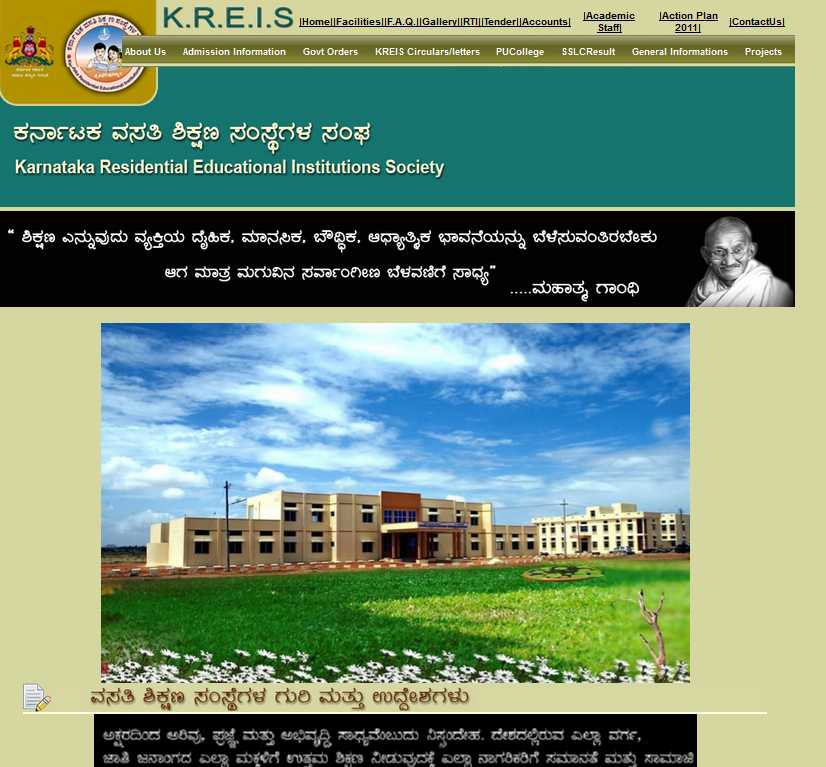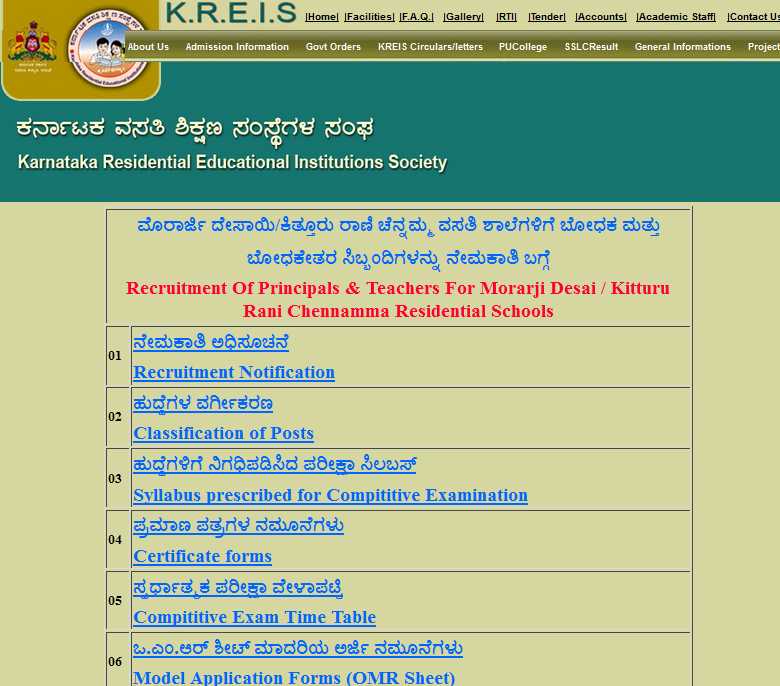As you want to get the syllabus of recruitment of Karnataka Residential Education Institutions Society KPSC Principals & Teachers For Morarji Desai / Kitturu Rani Chennamma Residential Schools so here is the information of the same for you:
Syllabus for Paper-1: General Studies:
Objective type Multiple Choice Questions on General Awareness, General Intelligence and Reasoning, Numerical Ability, Mental Ability, Teaching aptitude, General English, General Kannada and General Knowledge.
Syllabus for Paper-2: Education -1:
Educational Administration:
Constitutional provisions and directive principles for education in the Indian Constitution, measures for fulfilling the Constitutional obligations;
Ø Role of different agencies (society, home, school) and their interrelationship in the administration of Education;
Ø Education in relation to fundamental rights, democracy, secularism and social justice;
Ø A critical analysis of the aims of Education in relation to national understanding.
a) Content and methodology changes on
b) Educational Administration and Educational Planning
Ø School- community
Ø Relationship in relation to quantitative and qualitative development in education.
Ø Role of Head of the Educational Institution as an Administrator, Academic Leader and Leader for the Development of the Institution.
Ø Class room organization and Management, Physical facilities in a school, school environment teacher role Leadership style of head master and its influence on teacher role performance.
Ø Class room management: Mechanisms for coordinated functioning in school
Psychological foundations
Ø Child development-Physical, intellectual, emotional and social;
Ø Problems of adolescence-role of home-school and society in dealing with them.
Ø Learning;
a) Concept;
b) Factors affecting learning
c) Motivation and measures for creating effective learning
situation
New Initiatives in Karnataka:
Ø Quality improvement programme in Education’
Ø Compulsory Primary Education and Incentive scheme for
compulsory Primary Education
Ø Incentive Programmes of Department of public Instruction and Social Welfare Department for the children of Primary and Secondary Education-Text-books,-Uniforms-midday meals,
Residential Schools etc.,
Ø School development and monitoring committees
Ø Systems of Examination
Ø Computer education in schools
Ø Sarva Shiksha ASbhiyan (SSA) and Ratriya Madyamika Shiksha Abhiyan (RMSA) goals/objectives.
Ø Inaservice Teacher training programmes
Ø Role of District Teacher Institute of Educational Training (DIET) and College for Teacher Education(CTE)
Ø Student/Teacher Welfare Programmes.
Ø Examination reforms-efforts to improve quality
Ø Action research
Ø Innovative experiments in distance EDUCATION
1.Keli Kali 2) Edusat etc.,
Ø Inclusive education programme
Ø Environment education and Health education in schools
Ø Recent programmes to promote.
a) Universal access
b) Universal enrollment
c) Univerasal retention
d) Universal achievement
Syllabus for Paper -3: Education -2:
Education for National Development.
Ø Emerging Interface between Political Process & Education.
Ø Right of Children for Free and Compulsory Education Act.
Ø Implementation of an educational policy-political will and effort, macro level requirements; action plans and programme guidelines as tools for implementation and essentiality of political support; State and Centrally Sponsored Schemes of Education
Ø Education and Economic Development
Ø Education and Individual Development
Ø Education and Socio-Cultural Context
Ø Learning Environment: the changing scenario
Ø Systems & Structures in School Education
Ø Universalisation of Secondary Education
Ø Impact of realizing the UEE on Secondary Education: access, enrolment, participation and achievement: status of USE. USE: issues and concerns Lessons from implementation of UEE
Strategies for realization of targets.
Syllabus for the Combined Competitive Examination to the cadre of Subject Teachers:
Syllabus for Paper -1: General Paper
GENERAL KNOWLEDGE:
1.Famous Books and Authors
2. Important Inventions & Discoveries,
3. Basic science – Scientific Phenomena
4. Hygiene and Physiology (Human),
5. Chronology of Events in World History
6. Glimpses of Indian History
7. Geographical terms(basic)
8. Sports – International & National figures
9. Awards, Honors and Prizes
10. Indian culture – Land & people – festivals. Physical geography – Population – Literacy-Natural regions – Natural Resources-Food crops – Non – Food crops-Major Industries – Projects – Public undertakings-Indian Art – Artists of recognition – Classical Awards for various achievements -National Policy on Education, Constitution of India – Major items-Union Govt. –and State Govt. – Cabinets – Indian leaders of International & National Recognition- (Who is who – India)
11. Current International affairs –India’s Foreign relations
12. Current National affairs.
MENTAL ABILITY:
Analogy, Classification test, Blood relation test, Series completion Test, Direction source test, Alphabet test, Abstract reasoning Test Logic test, Verification test, Coding and decoding test
EDUCATIONAL PSYCHOLOGY:
Meaning and methods of Educational Psychology, Growth and Development, Individual Differences, Learning, Personality and Mental Health, Group Dynamic
Syllabus for English Language Teacher:
ENGLISH:
Pronunciation, Spelling, Parts of Speech, Time and Tense, Modals, Prepositions, Articles, Phrasal Verbs, Reported Speech, Agreement, Grammar and Usage, Functional English,
Synonyms, Antonyms, Idioms and Phrases, Prefixes and Suffixes, Error Detection, Comprehension, Cloze, Shuffling Sentence Parts, Shuffling sentences in Paragraphs, Testing and Evaluation, Methods/Techniques, ELT Terms
Syllabus for Hindi Teacher
1.Bhasha Vignan
2. Sahityaka Ithihas
a) Adikal
b) Bhakthikal
c) Reetikal
d) Adhunik kal(Gadhya )
e) Adhunik Kal(Padhya]
Syllabus for Mathematics Teacher:
PHYSICS:
Mechanics, Properties of matter, Heat and Thermodynamics Waves, Sound, Light, Optics, Electricity and Magnetism, Electronics and modern physics Theory of active and passive networks and devices, filters, power supply. Digital electronics. Atomic Spectroscopy, Atomic structure, charge, mass and e/m. Molecular spectra, Lasers and masers. X-rays and crystal structure. Free electronic theory, semiconductors-Band theory. Magnetic materials. Quantum mechanics:- Wave mechanics, matter waves, Eigen functions, Schrödinger wave function. Special theory of relativity, Lorentz contraction, time dilation, Doppler effect, Ultimate speed. Aberration, variation of mass. Properties of nucleus, detectors, accelerators, nuclear decays, Nuclear models, Fission and Fusion, Nuclear reactions binding energy, Cosmic rays, fundamental particles.
MATHEMATICS:
Numbers and Numerals-Number systems, Number sets, Basic operations, Properties, Square numbers and Square roots, Cube numbers, and cube roots, Irrational numbers, Sets ,Matrices, Mathematics in day today activities, Statistics, 4.Permutations and Combinations, 5.Modular arithmetic 6.Algebra-Basic concepts, operations and properties, Exponents, Factors and Factorization Surds 7. Equations-Linear and Quadratic equations, 8.Geometry-Basic concepts, Axioms and postulates, Theorems, 9.Triangles,Circles,Quadrilaterals and polygons - definitions, properties and theorems 10.Mensuration , 11.Polyhedra and Network.
Syllabus for Science Teacher:
CHEMISTRY:
INORGANIC CHEMISTRY:
Atomic structure, periodic table, chemical bonding, metallurgy, d-block elements, f- block elements, co-ordination chemistry, industrial chemistry, analytical chemistry
PHYSICAL CHEMISTRY:
Gases, Colloids, Surface Chemistry, Thermodynamics, Nuclear Chemistry, Electro Chemistry, Indicators
ORGANIC CHEMISTRY:
Alkanes, Alkenes and Alkynes – IUPAC nomenclature, Isomerism, Functional groups Aromaticity, Vitamins, Hormones, Alkaloids, Carbohydrates
BIOLOGY:
Living World, Cytology, Micro Organisms, Life Processes, Food Production & Management, Environmental Science,
Syllabus for Social Science Teacher:
HISTORY:
Medieval India, Religious & Social reform movements, Delhi sultans, Bhakthi movement, Vijayanagar empire, Bahamani Sulthans, Great mughals, Marathas, Renaissance, Reformation,
Geographical discoveries, foreign invasion, Rise of English, Mysore sulthans, Wodeyars of Mysore, First war of Independence, National movement –Gandhian Era & partition & Independence, Geographical features on history, Pre-historic period, Ancient civilizations , Vedic age, Birth of new religions, Mauryans, Kushans, Gupthas, Vardhana dynasty, Southern dynasties, Rise of Christianity & Islam, Mediaval Europe, Rajputs, Rise of Revolutions & equality, Constitution development in India, Modern world – First & Second World war, Contemporary world
CIVICS:
Social & Economic development, Man as a citizen, Democracy, Local Self government, Democracy at work in India, Government at state level, Government at the centre, Defense of the country, Challenges and Problems of India, India and the world, World Problems and India’s policy, Constitution of India.
GEOGRAPHY:
Physical Geography, Environment, Layers of the Earth, Resources, Natural Regions of the earth, World climate, World Natural Vegetation, Human occupations, Human interaction with environment, India & Asia, Africa, North America, South America Australia ,Europe & Antarctica -Physical divisions, Climate, Natural vegetation and animal life, Resources, Agriculture, Mineral and power resources, Industrial Development, Transport and Communication, Layers of atmosphere, Universe
ECONOMICS:
Economics – Meaning and Definition, Basic concepts, National Income, Forms of Economic system, Institutional Set up, Infrastructure of Indian Economy, India – Agriculture development,
Relation between Agriculture and Industry, Trade- Domestic and Foreign Trade of India, State and Economic development, Socialogy, Political Science.
Syllabus for Computer Teacher:
Computer Fundamentals and C Programming:
v Introduction to C Programming:
History of C, Structure of C programme. The C character set, Contents, Variables and keywords, Types of contents and variables.
v C Instructions diocese
Type declaration and arithmetic instructions, Integer and float conversions. Type conversion in assignment, Operators in C, Hierachy of operators, control instructions, Input-Output statements in C (Formatted and Unformatted)
v Control Structures
Decision control structures, Logical operators, conditional operator and relational operators, Loop control structures - while, do-while, for loop, Break statement, Continue statement, switch-case control structure, go to statement.
v Arrays
One dimensional and multidimensional array, declaration, initialization and array manipulations, sorting (Bubble sort) Strings-Basic concepts, Library functions.
v Functions
Definition, function definition and prototyping, types of functions, types of arguments, recursions, passing arrays to functions, storage class in C-automatic, register, external and static variables.
v Pointers
Definition, notation, pointers and arrays, arrays of pointers and functions-call by value and call by reference, pointers to pointers.
v Structures and Unions
Definitions, declaration, accessing structure elements, arrays of structure in a structure, pointers and structures, unions-definition, declaration, accessing union elements, typed of, Enum Bit fields.
v Bitwise Operators
Bitwise AND, OR, Exclusive OR, Compliment, right shift and left shift operators.
v C Preprocessor
Types of C Preprocessor directives, macros, file inclusion.
v Files
File operating modes, Text and binary files, High level and low level operations on file, command line arguments
Data Structures
v Introduction to data Structures
Definition. Classification of data structures. Operations on data structures, Introduction to Time and space Complexity.
v Primitive Data Structures
Integer, Character, float, strings-memory representation and primitive operations, String manipulation using pointers.
v Arrays
Storage Representation for ID and 2D arrays, Insertion and deletion on Id arrays, advantages and disadvantages of arrays.
v Linked Lists
Pointers, Dynamic Memory Allocation, singly Linked Lists, and Operations on linked lists, Insertion and deletion of a node, Introduction to circularly linked lists and doubly linked lists.
v Stacks
Concepts, Operations, sequential and linked implementation, Application of stacks, recursion, tower of Hanoi, infix to postfix conversion, Evaluation of Postfix Expressions.
v Queues
Concepts, operations, sequential and linked implementation, Circular queues, Priority queues and Dequeues (Introductory concepts), Application of queues.
v Trees
Definitions and concepts - Binary trees, Sequential and Linked Representation of Binary Tree Trees, Insertion and deletion on binary trees, Binary Tyree Traversal.
v Graphs
Concepts, Sequential and linked representation of Graphs, BFS and DFS Traversal.
v Searching and Sorting
Linear and Binary search, Selection sort, Insertion sort, Quick sort, Merge sort.
Operating System:
History of Operating System, Simple Batch Systems, and multi programmed Batched Systems, Time Sharing Systems, Personal Computer Systems, Distributed Systems and Real- Time Systems, Operating System Structures- Command Interpreter System, Operating System Services, System Calls, System Programs.
Contact Details:
Karnataka Residential Educational Institution Society
# 179, 1st & 3rd Floor,
Roopa Complex,
1st Main Road,
Sheshadripuram,
Bangalore - 560020
Karnataka
India
080 - 23563366, 23562255
Fax:080 - 23562288,
E-mail:
edkreis@rediffmail.com.

